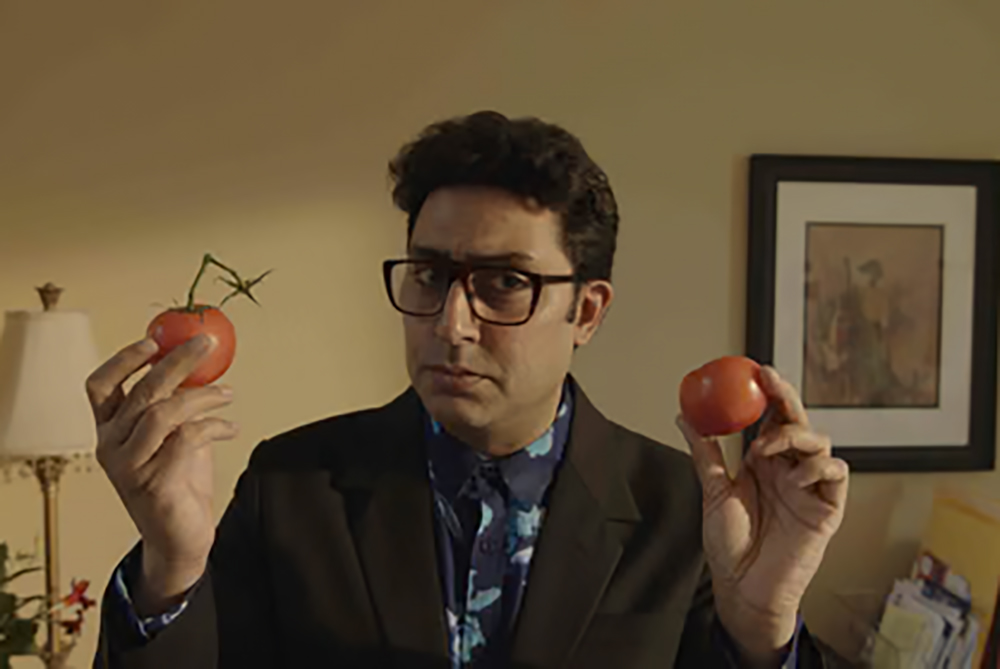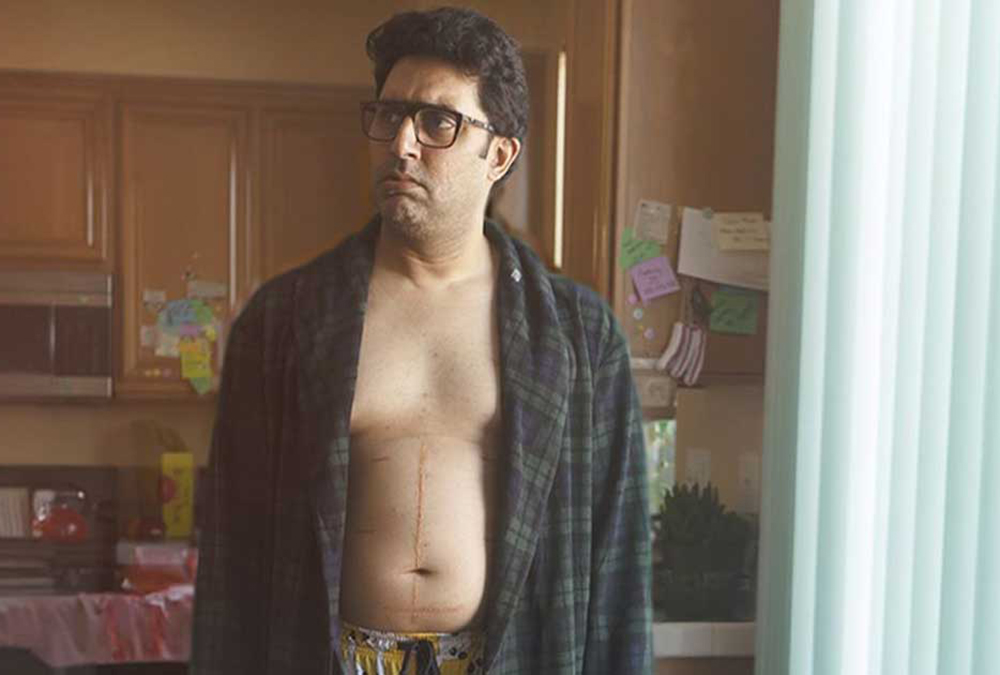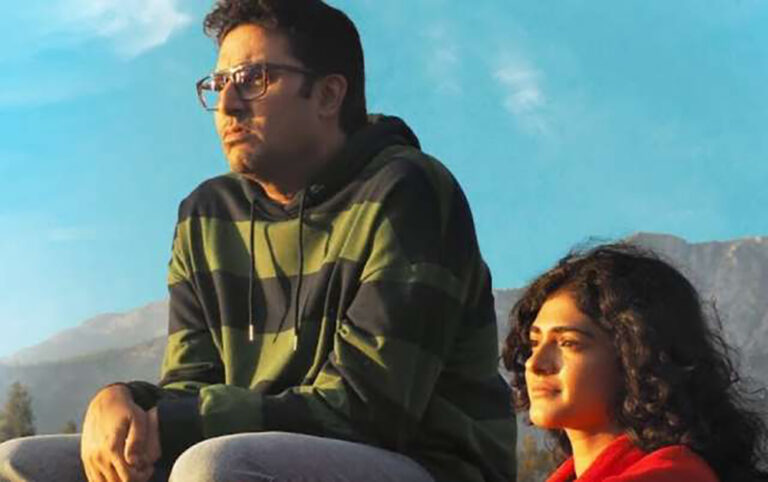In ‘I Want to Talk,” Arjun Sen (Abhishek Bachchan) is a strategic man who lives by statistics and relies on his larynx to promote brands. At times he even manipulates his daughter Reya’s emotions and social circle at school to publicize junk food brands he’s trying to sell. However, his larynx ultimately ‘betrays’ him after he is diagnosed with laryngeal cancer. Ambitious and hard-working, he finds himself at the hands of surgeons who run the ship now. His treatment proves to be a tumultuous, lengthy journey of learning, unlearning, listening as well as sinking, floating and the occasional motion sickness.
Once in the business of ‘cheating’ clients (he prefers the term’ marketing’/’brand preference’), there is one last client Arjun is yet to cheat—Death. And as per usual, the determined salesman might just have the final say. He’s also not average, but a self-proclaimed ‘Armstrong’, viewing every single close brush with death in the ER as his personal moon landing. Much like his voice box that’s overstuffed with leftover tissue, there’s also no more space left in Arjun for cynicism either. He finds no other choice but to keep moving, leave suicide ideation in the rearview mirror, and run the marathon of life if he wants to live… and most importantly, if he wants to talk.
Shoojit Sircar Direction Keeps the Film Grounded
Based on a true story, Arjun Sen’s transformation into a dead man still walking after multiple surgeries is nothing short of a medical miracle. And Director Shoojit Sircar’s distinct style of nuanced storytelling—backed by Ritesh Shah‘s screenplay and dialogue—keeps it grounded. Sircar has never disappointed me in deeply investing me in his stories as he tells literal and symbolic journeys of his characters and their situations. “I Want To Talk” feels like a culmination of many metaphors and motifs from Sircar’s previous notable works such as “Piku” (a road trip movie that deals with how stifling one’s emotions can feel ike living with chronic constipation) or “October,” which pulled focus to a one-sided conversation between an inquisitive man and his comatose co-worker. In fact, a main character who longs to speak or be heard seems to be a mainstay in most of the filmmaker’s work.
Sircar also remains consistent in his ability to draw comparisons between a diseased body and a diseased relationship. In this instance, it’s between Arjun and his daughter Reya (a child of divorce), whose bond is equally in dire need of repair and often relapses, much like Arjun’s cancer. His body isn’t repairing itself, and each surgery takes a worse toll than the previous one. But at least Arjun can now allot time to repair and salvage this damaged relationship.
Initially self-assured he isn’t just an average man—and as conversations between he and Raya progress—it dawns on him that as a parent or husband, he tends to be below average. The phrase ‘doctor’s ego’ might just apply to this born marketing man as well. Materialistic desires mean nothing when Reya is probably the only person who sees the real Arjun. He may be able to coerce everyone else, but he’ll never be able to coerce her. Sircar highlights this early in the movie as Arjun lies to a young Reya that ‘children can’t attend The Oscars’ when she asks to tag along to a red-carpet event he has an invitation to. Later she ousts him from her crudely drawn circle of trust. Thus, even when he rebrands himself as a more mellow or chill dad with cringe jokes to boot, his old habits still return to haunt him.
Empathy and Understanding Abound

“I Want to Talk” also dwells on the central theme of chance, a word thrown around quite a bit in this movie. This applies to both Arjun’s professional life, or him living his life at the mercy of this same chance that earned him his bread and butter. When he’s diagnosed with cancer, he worries about the odds of survival and of dropping dead like a fly in the street, by chance. Eventually, he understands there’s a fine line between living by chance and by choice, and begins to not just walk that line nor tread it, but runs it. He takes a chance on those surgeries, whether they kill him or make him stronger (astoundingly, it’s always the latter). He strives to survive; after all, he’s promised Reya he’ll dance at her nuptials, come hell, high water, or another painful surgery… and even doctor’s orders can’t hold him back.
Unlike Arjun’s achievements in the workplace, this is one achievement that doesn’t stem from materialistic gain. This gradual character development also elicits much empathy from viewers to Arjun’s condition since he is reduced to a project, after being in charge of many projects at his old job. The film also further evokes empathy and understanding, while also providing insight into Arjun’s closed-off nature. For instance, he sends out cryptic gifts to acquaintances to disguise his unhappy, pessimistic thoughts. His friends and acquaintances, however, erroneously interpret this as Arjun finally making peace with or moving on from his illness. Arjun also gradually begins to notice the loss of loved ones in his personal life; and while initially not one to grieve or give into grief, he learns it’s ok to be in mourning, even if it is in silence.
Abhishek Bachchan Leads a Talented Cast
Along with the aforementioned metaphors and well-developed character traits, the structure of “I Want to Talk” infuses a lot of depth. It is not melodramatic nor a generic survival story, but a well-crafted ‘prognostic study’ that immerses viewers into the excruciating experience of its protagonist. And just like the grueling process of jaw surgery, this is a story of endurance. It’s one of breaking, repairing and rejoining, and of pushing forward while not allowing one’s flaws and scars to define them in the long run.
The performances are quite earnest. Apart from committing to the physical demands of this role, as Arjun, Abhishek Bachchan nails his role with precision. He brings sincerity to a man who’s been insincere to himself and others. He is especially impressing with his body language, and striking a balance between annoying, diplomatic, stoic, and almost cold without coming across as wooden. One can’t help but pity Arjun upon seeing his pained and languishing expressions, caused by the fatigue of illness and the realisation he hasn’t talked much to the one person who matters most in life, his daughter. His daughter.
A Parable on Communicating with the Ones You Love

Pearle Dey and Ahilya Bamroo (as younger and older Reya, respectively) offer ample support and balance both the angst and genuine warmth of this character. Veteran comedian Johnny Lever plays the typical cranky yet kind handyman, and is funny in short bursts. He lends light-heartedness to the bleakest of scenarios. Kristin Goddard also deserves a special mention. She plays Nancy, an empathetic nurse in a field wherein medical personnel and busy surgeons with weekend golf sessions on their minds tend to usually come across as desensitised and lacking bedside manner.
Overall, “I Want to Talk” leaves viewers with a moral that harkens back to Shoojit’s “October” once more. It imparts that there are some things you should’t leave to chance, and being able to talk to someone while hurting can be of utmost importance. After all, failure to communicate and an inability to listen is very much like a cancerous cell… it only multiplies with time.



